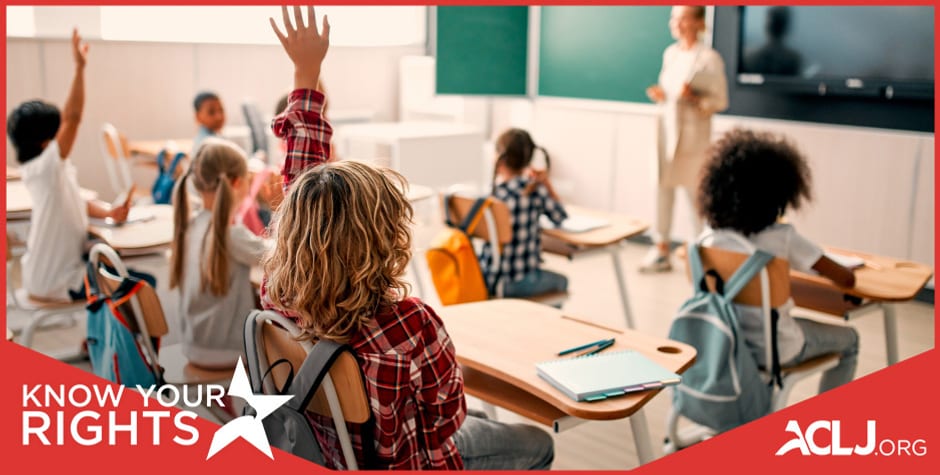Know Your Rights: Students Maintain Their Constitutional Rights to Freedom of Religion and Free Speech While at School
It’s common for concerned parents to reach out to the ACLJ because their child’s constitutional rights were silenced at school. Whether it’s a teacher simply not understanding the law or the administration having a lapse of judgment, we are typically able to resolve these situations quickly for your child.
The ACLJ has ensured that public school students maintain their rights to freedom of religion and freedom of speech ever since 1990 when our Chief Counsel Jay Sekulow argued and won Board of Education v. Mergens at the Supreme Court. With this case, it became settled law that student Bible clubs and prayer groups can meet on public school campuses without violating the Establishment Clause.
Through our Know Your Rights series, we will continue to educate the public on their First Amendment freedoms. Find a more in-depth review of the law regarding your child’s constitutional liberties at school in this legal memo.
The First Amendment to the United States Constitution protects a student’s rights to freedom of speech and expression along with the student’s religious freedom. In fact, the right to persuade or advocate a religious viewpoint is one of the reasons the First Amendment was adopted, and private religious speech is no different than any other expression. Capitol Square Review & Advisory Bd. v. Pinette.
In the fundamental decision Tinker v. Des Moines, the Supreme Court held that students do not “shed their constitutional rights to freedom of speech or expression at the schoolhouse gate.” What this means is that the school is held to the same standard as any other government entity with the requirement to protect a student’s rights to evangelize, assemble, pray, and write about their faith in assignments.
In fact, school officials can only restrict student speech if it will “materially and substantially interfere with the requirements of appropriate discipline in the operation of the school.” This standard set by the Supreme Court requires more than just the fear or concern that offense will be taken and is applicable during instructional time. Thus, student religious speech, including the distribution of literature, during breaks, in the lunchroom, at recess, and before and after school cannot be restricted.
A recent example of the kind of issues we are seeing in schools is detailed here, where a third grader was told she couldn’t bring her favorite book - the Bible - to school. We successfully intervened protecting her rights.
The ACLJ will never stop fighting to vigilantly protect your child’s right to hold religious clubs and gatherings, evangelize, write about their religion on assignments, pray and read their Bible, and wear clothing or jewelry reflecting religious messages and symbols while at their public school. We are dedicated to defending your constitutional rights. We have been providing assistance and legal representation, at no cost or charge, to people just like you for decades. If you or your child’s rights are being violated in this area, please contact us at ACLJ.org/HELP.
